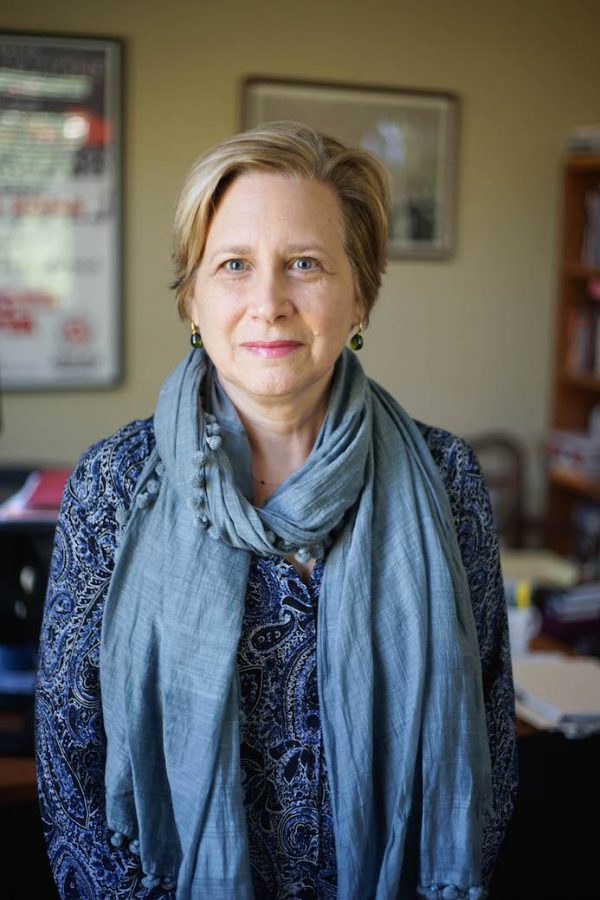Professor Marla Stone, the history department chair, will spend February to June of 2017 in Florence, Italy, at the European University Institute (EUI) as a Braudel Fellow affiliated with the department of history and civilization. Although Stone specializes in Italian fascism, this fellowship will mark her first time studying in Florence.
Her goal while abroad is to finish a book she has been working on for the past seven years: “The Enemy: The Politics and Propaganda of Anti-Communism in Italy.” Following the conclusion of her fellowship, Stone will return to Occidental in time for the fall 2017 semester.
“I’m most excited about the chance to cross-fertilize with other historians [and] to study in Europe, where the events I’m writing about took place,” Stone said.
In her book, targeted toward historians and political scientists of Europe, Stone hopes to present a conceptualization of Italian politics from 1919, the beginning of the fascist period, to the present. This will include the centrality of political enemies and its impact on and potential distortion of Italian democracy.
According to Stone, students come from all over Europe to get graduate degrees at the EUI, a postgraduate and postdoctoral institution. She will work with the faculty there to put on workshops, seminars and public lectures. This fellowship will be a new experience for her since she does not have the opportunity to work with graduate students at Occidental.
Stone’s colleague, History Professor Sharla Fett, said the fellowship will provide Stone with the opportunity to step back from the work she does within the department at Occidental and focus on her own research and writing. According to Fett, the department supports Stone in this pursuit of her research.
“Because of the depth of cultural and political knowledge that Professor Stone brings to her work on Italian anti-communism, I know I’m not alone in saying that I can’t wait to read the book,” Fett said via email.
Stone said her initial interest in Italian fascism stems from her days as a graduate student at Princeton University in the ’80s.
“I was very interested in questions having to do with the 1920s and ’30s and the collapse of democracy,” Stone said. “Fascism seemed like one way to understand this crisis of the democratic state.”
Stone emphasized the importance of faculty engaging in fellowships away from their primary institutions, but acknowledged that doing so is not always feasible when one has a family. She has been able to partake in previous fellowships because her husband would ask for leaves of absence from his job to accompany her on her trips with their daughter.
“It’s very important for faculty to have a chance to take time to go somewhere and have a residential fellowship,” Stone said. “I think it really strengthens our teaching, to be able to get new ideas, percolate with different people, have time to really focus on [our] scholarship and then come back to Oxy refreshed.”
Thomas Egan (sophomore), who is currently enrolled in Stone’s course, The Holocaust: History, Testimony and Memory, also sees the value in broadening one’s horizons through time abroad.
“When you go to somewhere else and you’re exposed to new views and your views are challenged, that’s when you tend to grow,” Egan said. “That’s when you tend to develop new ideas and think of things in ways you didn’t think before.”
Claire Cancilla ’15, a former advisee and student of Stone who majored in history, attests to Stone’s academic enthusiasm and knowledge about her field of study. She said that Stone contributed to the broadening of her perspective on historical study. Historical dates and facts, she said, only comprise one part of studying history — understanding the impact of historical events on people as well as how earlier events can set future ones in motion is the larger, more interesting component.
“What I enjoyed most about taking Professor Stone’s courses was her concerted effort to connect the past to the present,” Cancilla said via email. “She teaches her students that history doesn’t exist in a vacuum, but is actually dynamic, debated and impacts the present day.”
Stone applied for the Braudel fellowship last October and was notified of her acceptance December 2015. It will be one of numerous fellowships that she has accepted since her arrival at Occidental in 1994. Her self-professed adventurousness and love for travel have served Stone well in her past fellowships; Italy is her favorite destination.
From 1995 to 1996 she had a fellowship at the American Academy in Rome as a Rome Prize Fellow. While there she worked on her first book, “The Patron State: Culture and Politics in Fascist Italy.” In fall 2007, Stone was a fellow at Princeton’s Davis Center for Historical Studies.
During her most recent fellowship, she spent 2011 to 2012 at Stanford’s Center for Advanced Study in the Behavioral Sciences as one of 30 fellows in different fields — including sociologists, political scientists, historians and anthropologists — who gathered to share their work.
Stone’s current class on the Holocaust, first introduced this semester, will culminate with her bringing 12 students to Berlin, Warsaw and Krakow in June.
“I’m taking my love of studying and working on-site and sharing it with my students,” Stone said.
![]()































